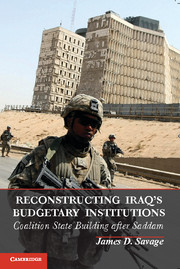Book contents
- Frontmatter
- Dedication
- Contents
- List of Tables
- List of Figures and Illustrations
- Preface
- Abbreviations
- 1 State Building and the Reconstruction of Iraq’s Budgetary Institutions
- 2 The Evolution of Iraqi Budgetary Institutions from the Ottomans and the British Mandate through Saddam
- 3 Prewar Planning for Iraq’s Economic and Budgetary Reconstruction
- 4 Boots on the Ground
- 5 Building Iraqi Ministerial Capacity
- 6 The 17th Benchmark and the Challenge of Iraqi Budget Execution
- 7 Building Iraqi Budgetary Capacity
- 8 Iraqi Budgeting
- 9 Successful State Building in Iraq?
- Bibliography
- Index
- References
4 - Boots on the Ground
The CPA and the New Iraqi Budgetary Process
Published online by Cambridge University Press: 05 June 2014
- Frontmatter
- Dedication
- Contents
- List of Tables
- List of Figures and Illustrations
- Preface
- Abbreviations
- 1 State Building and the Reconstruction of Iraq’s Budgetary Institutions
- 2 The Evolution of Iraqi Budgetary Institutions from the Ottomans and the British Mandate through Saddam
- 3 Prewar Planning for Iraq’s Economic and Budgetary Reconstruction
- 4 Boots on the Ground
- 5 Building Iraqi Ministerial Capacity
- 6 The 17th Benchmark and the Challenge of Iraqi Budget Execution
- 7 Building Iraqi Budgetary Capacity
- 8 Iraqi Budgeting
- 9 Successful State Building in Iraq?
- Bibliography
- Index
- References
Summary
New institutions may be created by enacting rules that set the terms for proper practices, processes, and procedures that become standardized and routine over time. The Coalition Provisional Authority applied this approach by creating budgetary institutions that differed substantially from those employed by Saddam Hussein. How did the CPA undertake this task and with what success? Handicapped by a host of obstacles, including a remarkable lack of information about the existing Iraqi fiscal ministries and their budgetary procedures, the Coalition entered Baghdad during the chaos that accompanied the March invasion. Coalition officials presumed they would encounter a reasonably intact and functioning Iraqi government. Instead, they found destruction, looting, incapacity, and deteriorating security. Under these conditions, the CPA’s ad hoc budget team stitched together a budget that completed the 2003 fiscal year with new priorities for a post-Saddam Iraq. During its fourteen months in existence, the CPA issued a series of “Orders” that set out rules outlining the government’s budget formulation process, the powers of the Ministry of Finance, contracting and procurement procedures, and the basis for provincial budgeting and finance. These rules were imposed on the Iraqis, but they were integrated into the existing system of rules rather than fully displacing them. When the CPA dissolved on June 30, 2004, the Iraqi government preserved significant elements of this new system, and they are regarded as among the CPA’s most successful achievements. At the same time, the CPA’s mismanagement of Iraqi funds and the failure to develop other critical elements of Iraq’s public financial management system contributed to a lack of institutional accountability and transparency, which undermined the government’s ability to control corruption. The CPA’s ability to make lasting institutional change in meeting international best practices was handicapped by the familiar challenges of state building, including the CPA’s own organizational command and coordination limitations, the restricted resources at its command, its inability to engage Iraqis fully into the reconstruction effort, and its own brief longevity and the transfer of sovereignty to the Iraqis. Moreover, existing institutions proved to be often quite durable and resistant to change, as vested interests defended the status quo. This chapter provides an account of these events, beginning with the discovery that Iraq was less than an intact state.
- Type
- Chapter
- Information
- Reconstructing Iraq's Budgetary InstitutionsCoalition State Building after Saddam, pp. 70 - 111Publisher: Cambridge University PressPrint publication year: 2013



